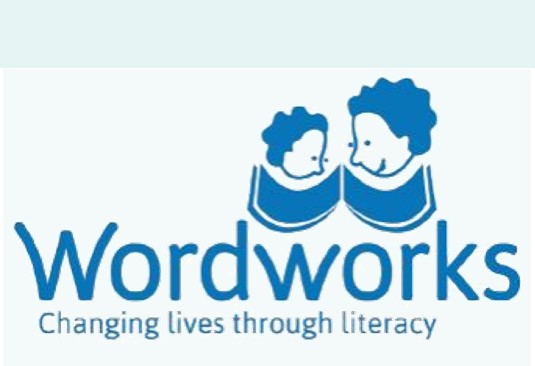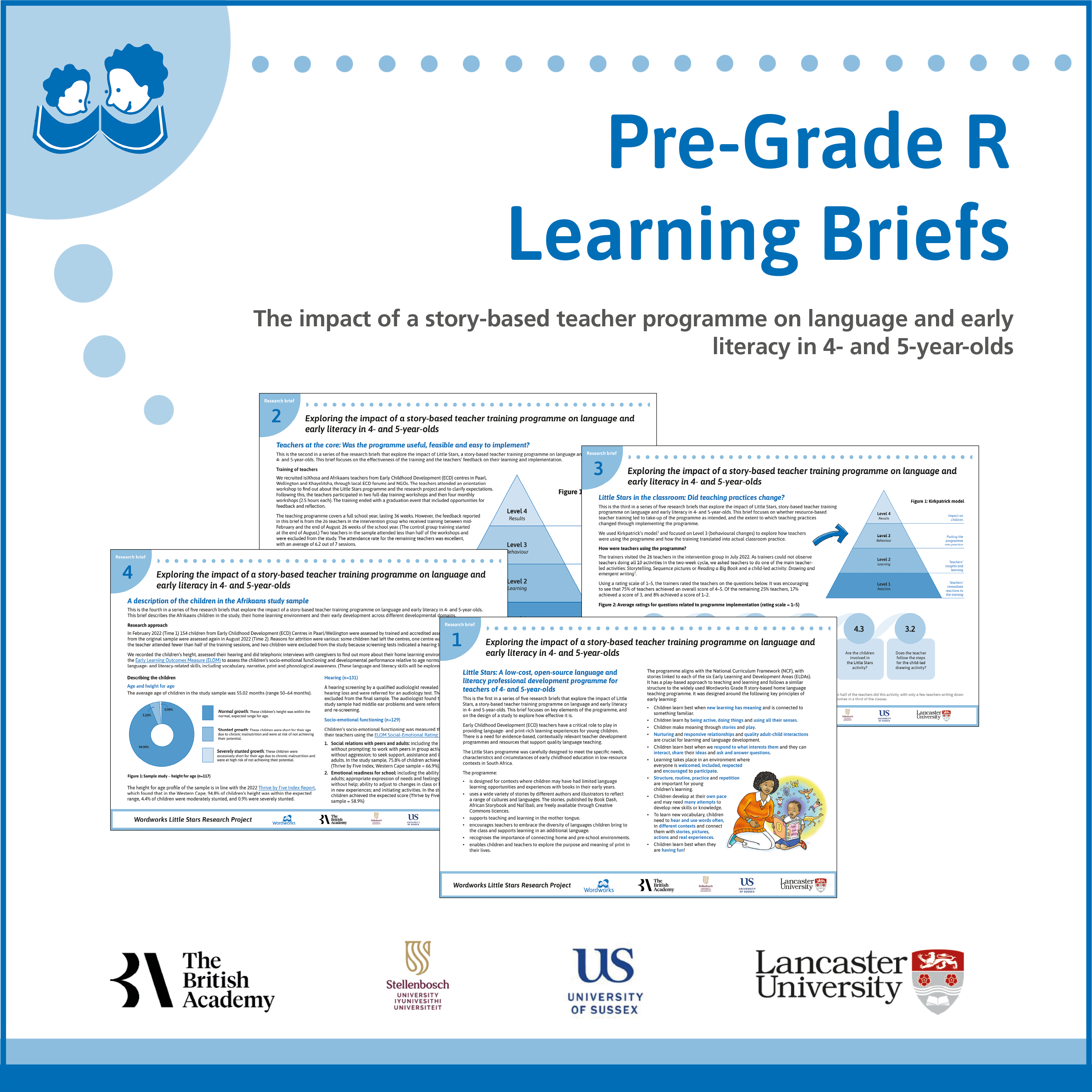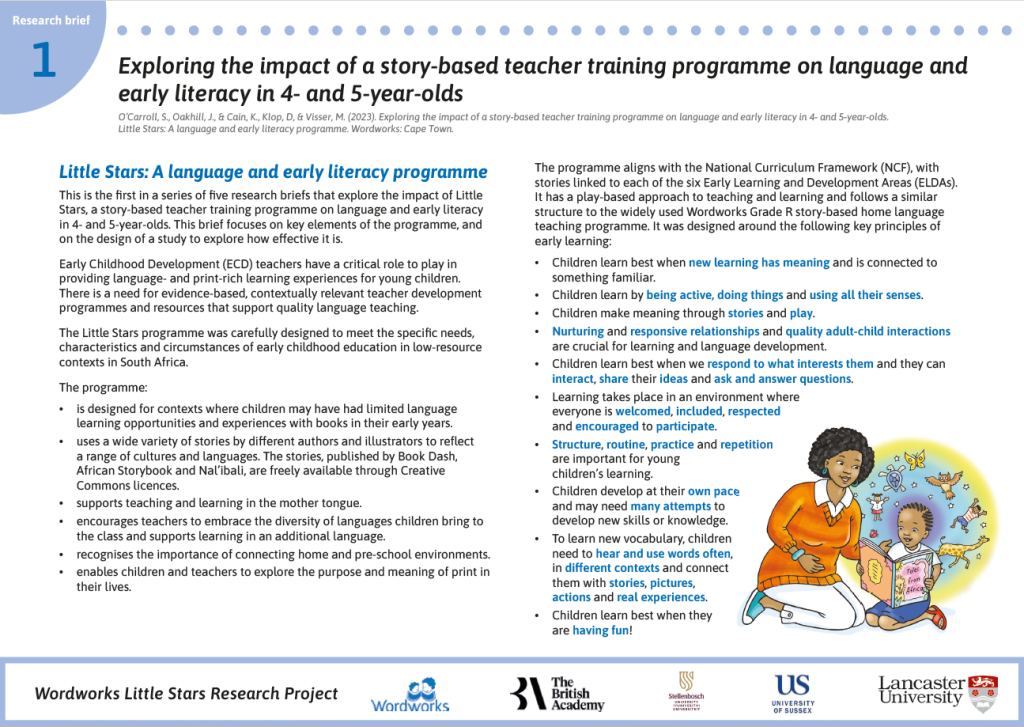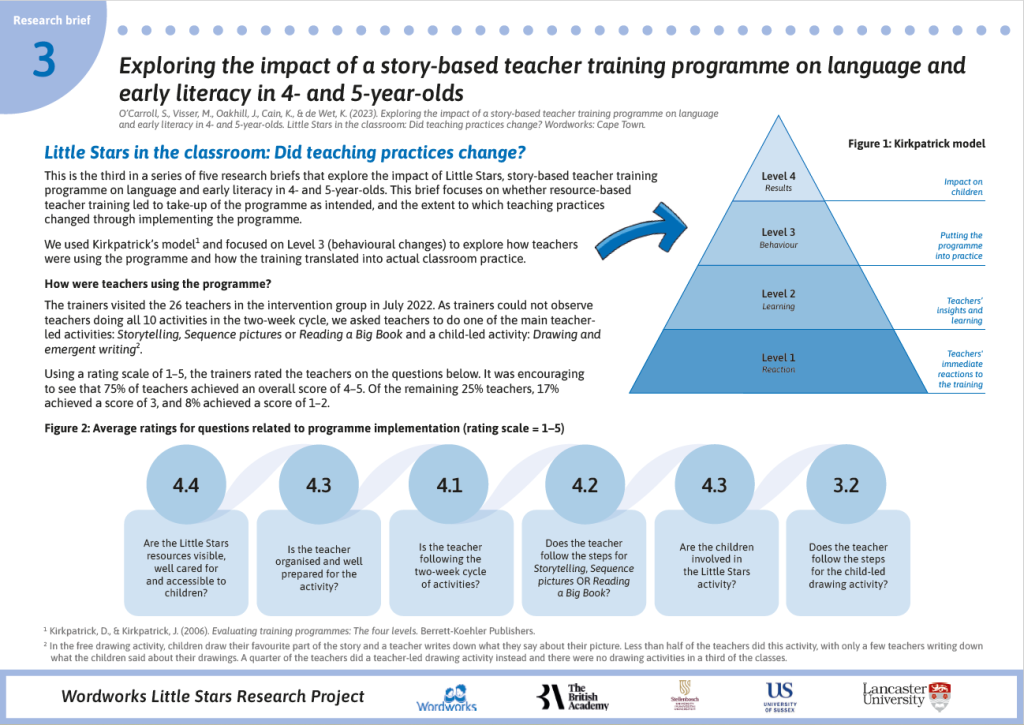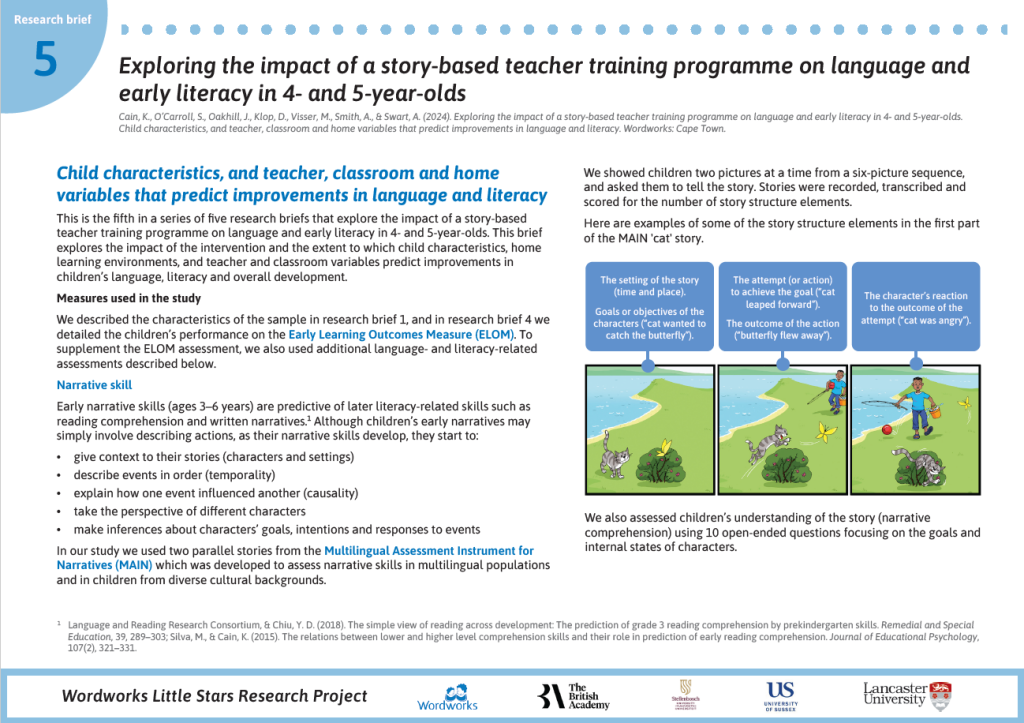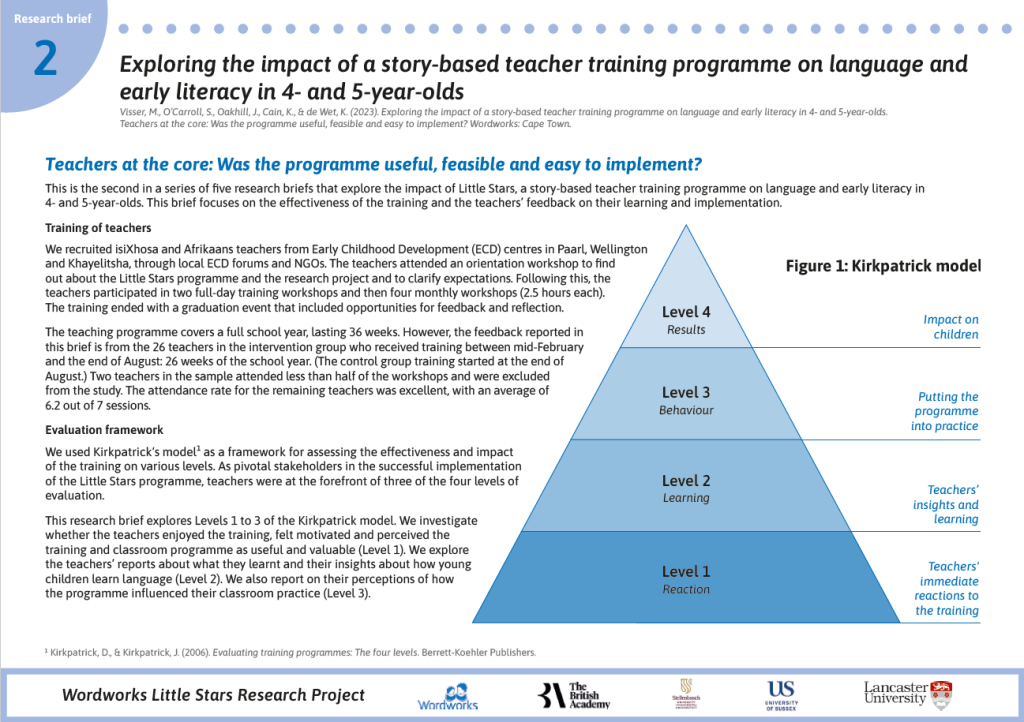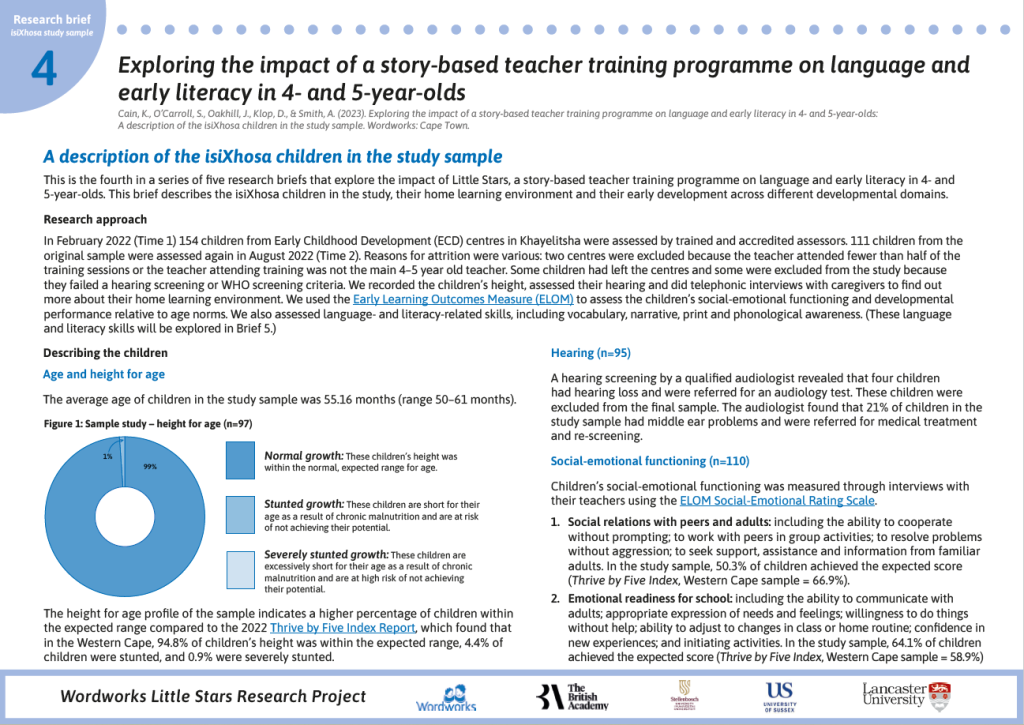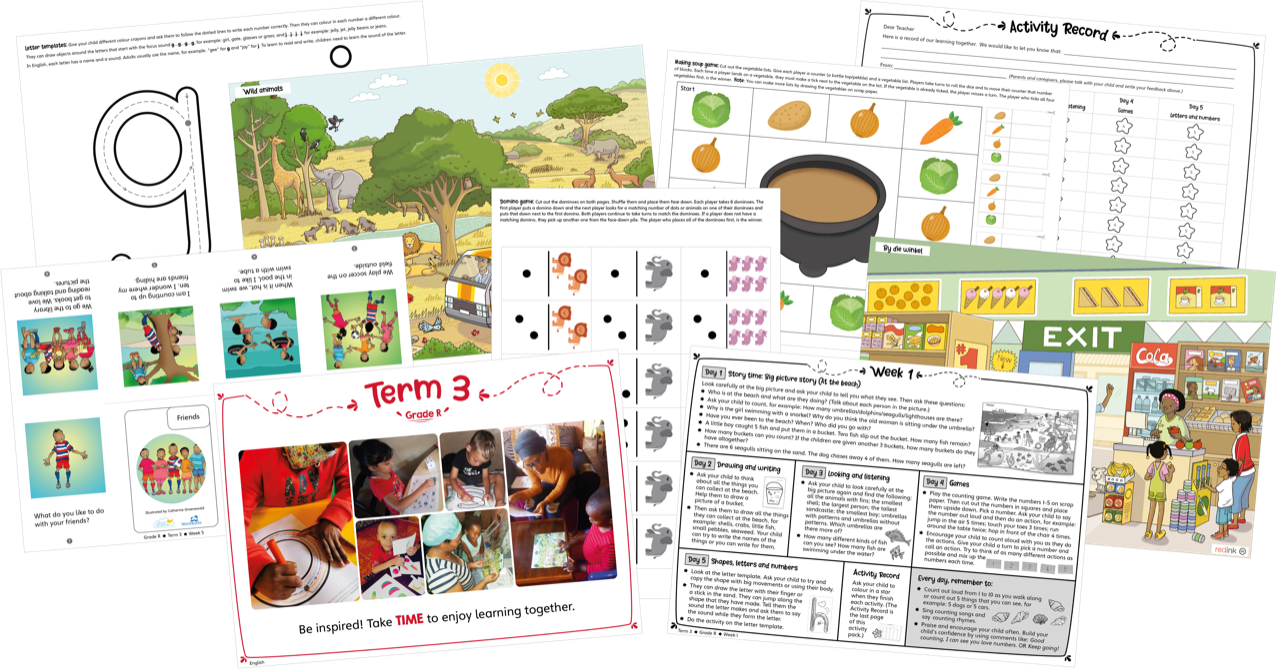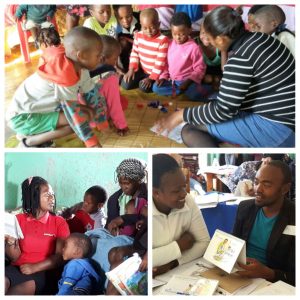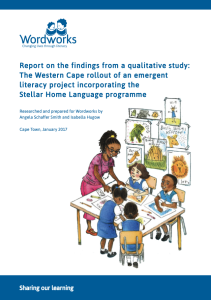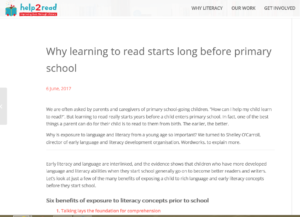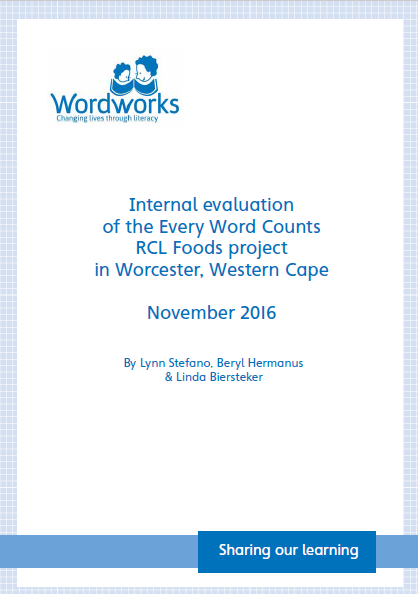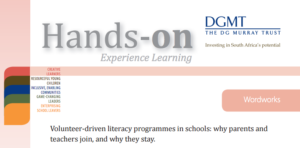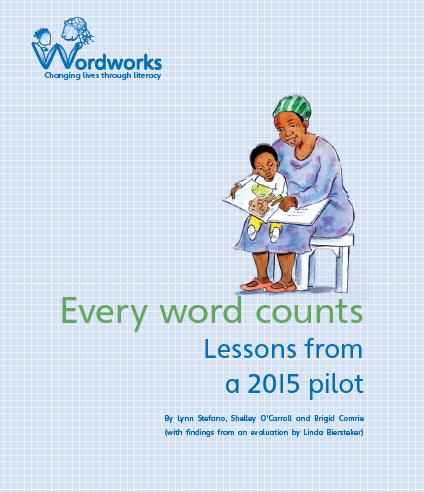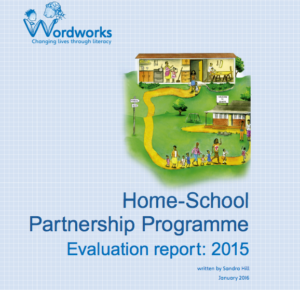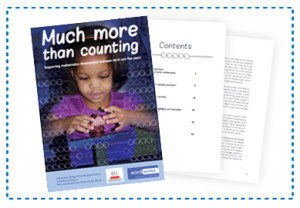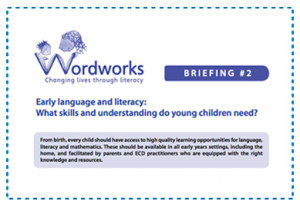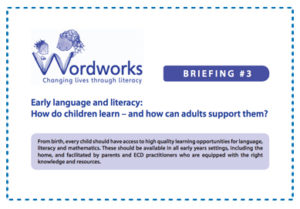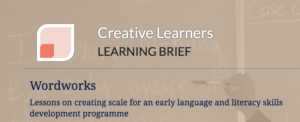Monitoring, Evaluation and Learning
Wordworks commissions external evaluations of our programmes and also conducts internal research on programme implementation. Here we share learnings from Wordworks programme-specific research.
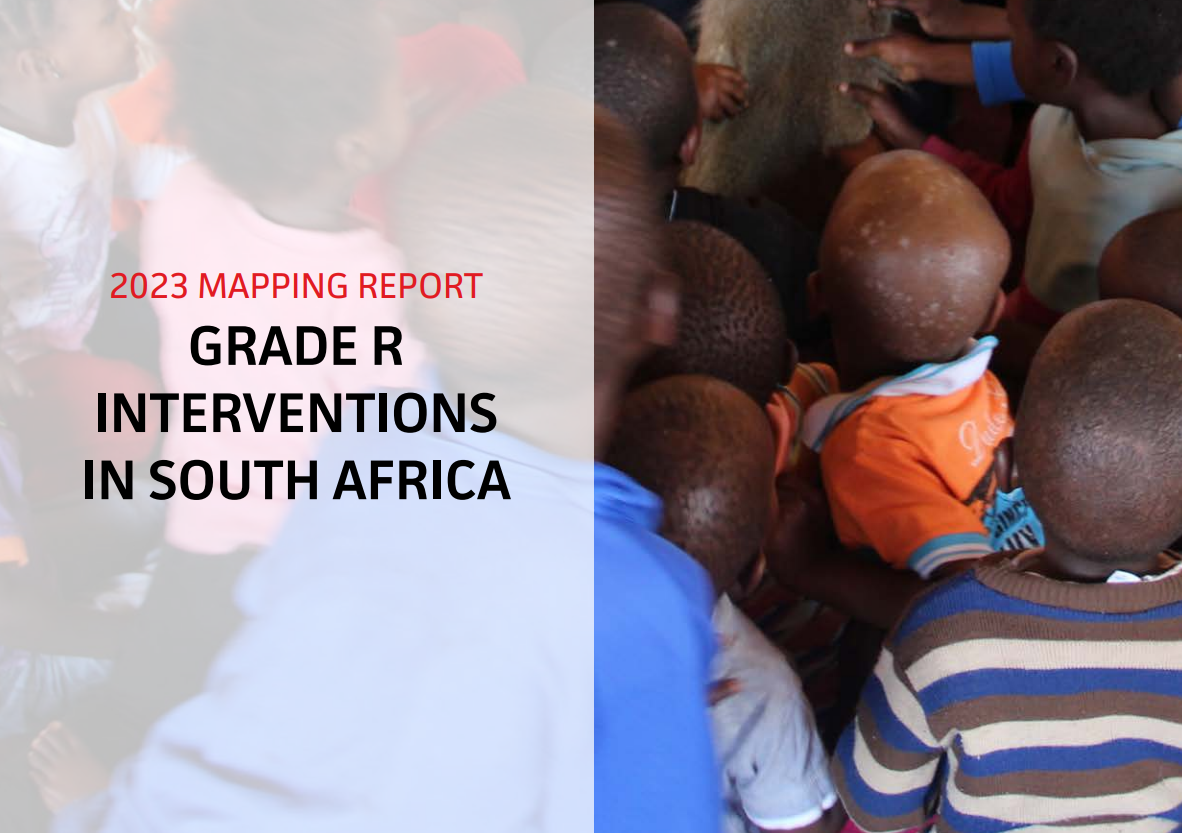
Roger Federer Foundation Grade R Interventions Mapping Report
This important study maps various Grade R interventions in South Africa in 2023. Wordworks interventions (with different partners) feature strongly, with the following being covered in this Report:
Wordworks Stellar programme
Wordworks Home-School Partnerships programme
Wordworks TIME programme
Read the full report here
(See more about these programmes here: https://www.wordworks.org.za/our-early-literacy-programmes/)
Gauteng Grade R Improvement Project Advocacy Learning Briefs
In 2020, Wordworks was commissioned to design the materials for the Gauteng Grade R Improvement Project, building on its Stellar Grade R Home Language programme.
Two Learning Briefs (see below) came out of this project. We also wrote a reflection on CAPS Home Language (Grade R).
Teaching Language and Literacy in Grade R
Drawing on research and best practice for teaching young children, we wrote two briefs that highlight key principles that underpinned the development of materials to teach letter–sound knowledge and strengthen oral language in Grade R. These materials were developed as part of a story-based Home Language programme for the Gauteng Grade R Language Improvement Project, a provincial teacher training programme targeting all Grade R teachers in public ordinary schools, special needs schools and registered ECD centres in Gauteng.
Learning Brief 1 describes the code-related aspects of the programme (letter–sound knowledge and phonological awareness).
Learning Brief 2 concentrates on those aspects of the programme focused on strengthening the teaching of oral language through a focus on oral storytelling. Read More
Read the Teaching Language and Literacy in Grade R Learning Brief (Letters and Sounds) here.
Read the Teaching Language and Literacy in Grade R Learning Brief (StoryTelling) here
Reflection on CAPS
To ensure coverage of and alignment with the curriculum, we looked at the content, concepts and skills covered in the CAPS document for each of the four terms in the Grade R year. We found the CAPS document challenging to navigate and therefore began by grouping related content, concepts and skills and tracking them for developmental progression across all four terms of the Grade R year. The process revealed several issues in the CAPS document: inconsistencies, repetition, a lack of conceptual coherence, incorrect use of terminology, and challenges with developmental progression across the Grade R year. We reflect on these issues in this brief. Read More
Read Reflection on CAPS Learning Brief here
What is the impact of a STORY-BASED TEACHER TRAINING PROGRAMME on language and early literacy in 4- and 5-year-olds?
Here is a series of research briefs on the Wordworks *Little Stars programme that explores this question. The research was conducted by a team made up of Dr Shelley O’Carroll, Prof Daleen Klop, Monique Visser, Annelien Smith and Anike Swart from the Stellenbosch University, Prof Jane Oakhill from the University of Sussex and Prof Kate Cain from the University of Lancaster in the United Kingdom.
*Little Stars is a low-cost, open-source language and literacy professional development programme (in 3 languages) for teachers of 4- and 5-year-olds. See more on this website.
Mid-year reports on the TIME (Together in My Education) home learning programme for Grade R and Grade 1 | 2022
These are summary reports on the activities and findings of this ongoing programme.
A version reporting on the TIME programme in the Western Cape only is available here.
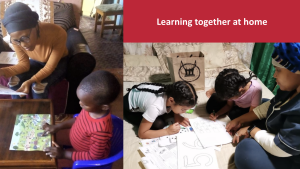
TIME chapter Global Education Innovation Initiative | 2022
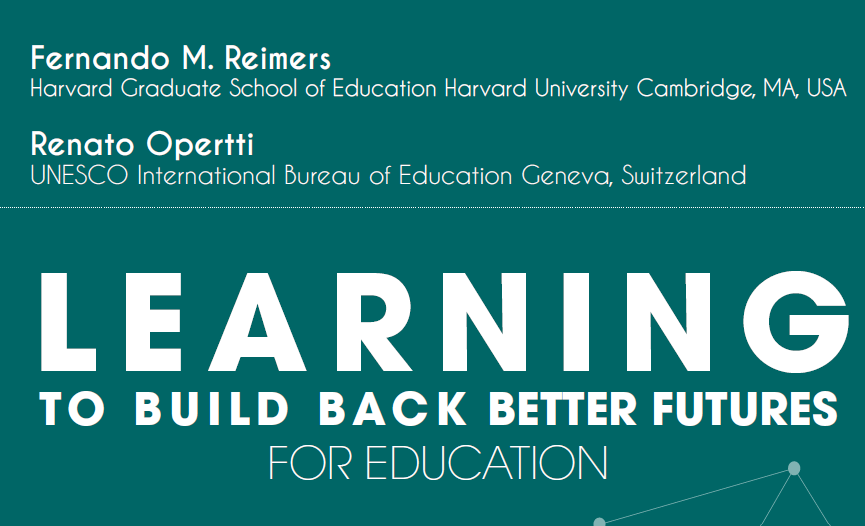
Report on the exploratory field study of the TIME home learning programme | 2022
This report presents the main findings that emerged from a comprehensive study of the TIME (Together In My Education) home learning programme, which took place between May and November 2021.
It details the series of data collection exercises that were undertaken to gain a deeper understanding of how the programme was being embedded in the Western Cape education landscape, how the various categories of users were feeling about the offering, how well it was being taken up in homes, and what benefits it was bringing to the various categories of users.
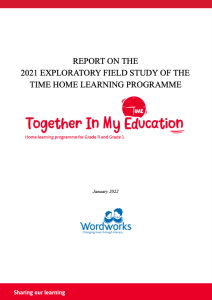
Report on the progress, learnings and achievements of the Yizani Sifunde project | 2021
Yizani Sifunde is a partnership project between Book Dash, Nal’ibali and Wordworks, with local Eastern Cape partners ITEC and Khululeka. The project is funded by the Liberty Community Trust and aims to improve early literacy practices in underserved communities in the Eastern Cape.
This report summarises the activities, outcomes and learnings from the first year of the project’s implementation and looks ahead to 2022.
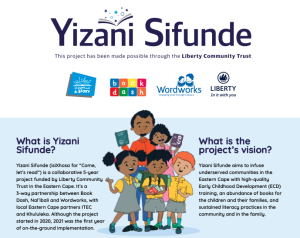
Monthly reports on the TIME (Together in My Education) home learning programme for Grade R and Grade 1 | 2021
These are comprehensive reports on the activities and findings of this ongoing programme.
Click on each month below to read the relevant report:
June 2021 | July 2021 | August 2021 | September 2021 | October 2021
Report on the at-home early language and literacy pilot for Grade R and Grade 1: Second mid-pilot report | 2021
This second mid-pilot report was compiled to summarise the work done to support schools and homes to use the at-home early language and literacy programme for Grade R and Grade 1 materials, and to reflect on the feedback received from districts and schools.
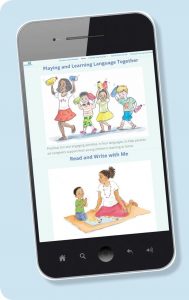
A review of the Every Word Counts Programme | 2018
Reflections on working in partnership to train trainers and support partners as they implement the Every Word Counts programme. The review covers the programme’s implementation from July 2016 to July 2018 and provides lessons to inform the way forward.
A study of the Emergent Literacy Project rollout in the Western Cape | 2017
In 2015 the Curriculum Directorate of the Western Cape Education Department (WCED) partnered with Wordworks to take its Emergent Literacy project (ELIT) to Grade R classrooms across the eight education districts of the Western Cape. ELIT incorporates the STELLAR Programme (Strengthening Teaching of Early Language and Literacy in Grade R) which Wordworks developed, implemented and refined over several years.
The purpose of this qualitative study was to deliver findings which illuminate the effectiveness of the ELIT ‘cascaded training with support’ dissemination model. By drawing on the key implementers’ accounts of the rollout, the research seeks to provide insights for future dissemination, refinement or replication of the ELIT project or similar large-scale training interventions in state primary schooling.
Why learning to read starts long before primary school | 2017
Our founder and ex-Director, Dr Shelley O’Carroll, spoke to help2read about building literacy skills with children, including giving practical activities, before they start primary school.
The CareUp project is a mobile communication intervention initiated by the Department of Social Development (DSD) in the Western Cape, and jointly funded by the DSD and Innovation Edge. It targets both practitioners at Early Childhood Development (ECD) centres working with classes of 4 to 5-year old children; and parents of the children in their class. CareUp aims to support quality communication between the parent, caregivers and their children.
Read the executive summary of the evaluation report here.
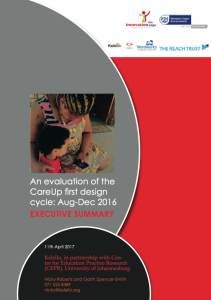
Every Word Counts RCL Foods Worcester Project Evaluation | 2016
This report documents an evaluation of the Every Word Counts programme (EWC) in Worcester, Western Cape, a partnership between Wordworks and the Foundation for Community Work (FCW) funded by RCL Foods. The evaluation aimed firstly to assess whether the model of delivery had effectively deepened participants’ understanding of early learning and language development, taught participants practical skills and activities and enabled participants to apply what they had learned; and secondly, how well the delivery and support model was working.
Reflections on whether reading programmes improve reading ability | 2016
The role of monitoring and evaluation in six South African reading programmes
This article focuses on six reading programmes, (including the Wordworks Ready Steady Read Write programme) and asks: Do these programmes work insofar as they improve the reading ability of programme participants?
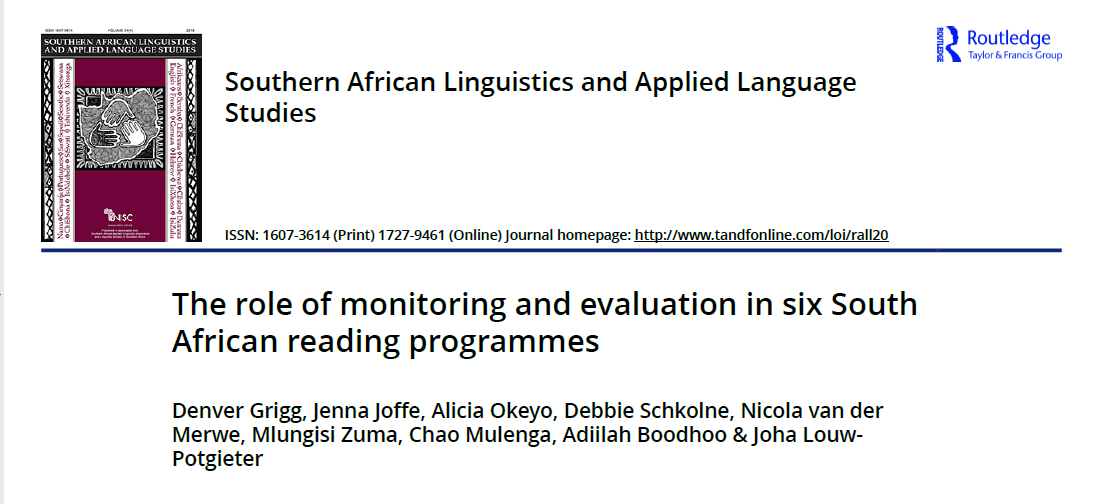
Volunteer-driven literacy programmes in schools: why parents and teachers join, and why they stay | 2016
To ensure that more children learn to read and write successfully, there is a need for early literacy interventions that support young children and for programmes that equip caregivers to become more involved. Wordworks’ experience sheds light on factors that draw volunteers into programmes and help sustain their involvement over time.
Lessons from a pilot of the Every Word Counts programme | 2015
This evaluation sets out the process of researching and developing the Every Word Counts programme and shares the findings of an evaluation of the training and resource package piloted in a non-ECD organisation that runs a home visiting programme.
Home-School Partnerships Programme: Evaluation report | 2015
This evaluation aims to distil ways of supporting informal learning at home, drawing from the Wordworks Home-School Partnerships programme. The evaluation presents synthesised feedback gathered from key partners and beneficiaries, teacher-facilitators, classroom teachers and parents who participated in the programme.
Much more than counting: Supporting mathematics development between birth and five years | 2013
This joint report by Wordworks and the Schools Development Unit describes the different ways in which young children learn mathematics and the main mathematics learning strands.
Narrowing the literacy gap: Strengthening language and literacy development between birth and six years for children in South Africa | 2012
This report discusses why language development in a child’s first years is so important to later reading and writing skills.
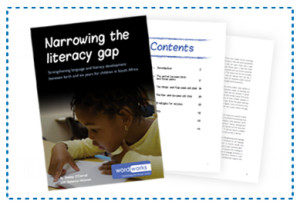
Narrowing the literacy gap: Making a case for the importance of early language and literacy development in South Africa | 2012
This learning brief provides a useful summary of our Narrowing the literacy gap report.
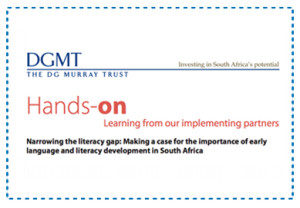
Early language, literacy and mathematics learning: Why does it matter and who benefits?
This briefing looks at why the period between birth and five years is such a crucial formative time for a child, setting the trajectory for their school years and beyond. It explains how the benefits of investing in this period are deep and wide, providing the foundations not only for individual flourishing, but also for a successful education system, a stronger society, and more efficient public spending. It also discusses how high quality opportunities for language, literacy and maths learning have been shown to be an essential element of any successful early years programme, and considers how and why language is at the heart of all learning.
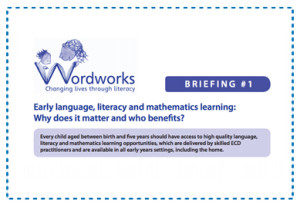
Early language and literacy: What skills and understanding do young children need?
This briefing looks at the skills and understanding that young children need in order to learn to read and write successfully. Improving knowledge of what these early literacy competencies are and how they can be nurtured in the home and other ECD settings must be a key part of any strategy to raise literacy rates in South Africa.
Early language and literacy: How do children learn – and how can adults support them?
The third in our series of policy briefings looks at the ‘how to’ of language and literacy learning in the pre-school years. As well as considering the question of how children learn, this briefing looks at the vital role of adults, the specific activities that support early literacy, and the key features of an effective learning environment.
Lessons on creating scale for an early language and literacy skills development programme | 2013
In this short article Wordworks shares the lessons learned while scaling-up the Home-School Partnerships (HSP) programme. There is strong evidence of the positive impact that the programme has on parents, caregivers and teachers, and, through them, children.
Read the learning brief here.
An exploratory study of early letter-sound knowledge in a low socio-economic context in South Africa | 2011
Shelley O’Carroll
This article explores one aspect of early literacy development in a low socio-economic context in South Africa through a study of letter-sound knowledge with Grade R and Grade One children. The results suggest an urgent need for quality Grade R teacher training programmes with a specific focus on emergent literacy.
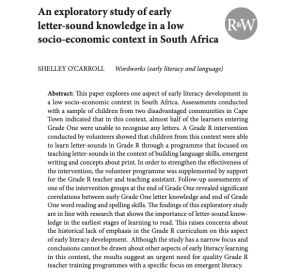
Submissions to government
Wordworks endeavours to engage carefully with government policy that affects early language and literacy development. This is a record of our formal submissions.
May 2015
April 2015
August 2014
Academic studies
These are unpublished postgraduate research reports and published journal articles that have explored an aspect of Wordworks’ programmes in supporting early language and literacy.
- Mufudzi Muzire dissertation: An outcome evaluation of the Home-School Partnerships Programme
- Alicia Okeyo dissertation: Strengthening Foundational Literacy – A process and outcome evaluation of the Wordworks Early Literacy Programme
- Dawn Cozett journal article: Literacy lessons learnt from parents after attending a seven-week Home-School Partnerships Programme
